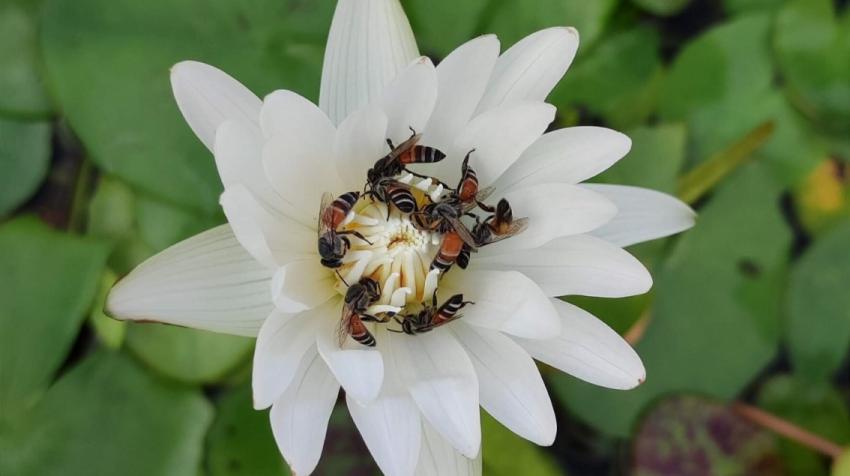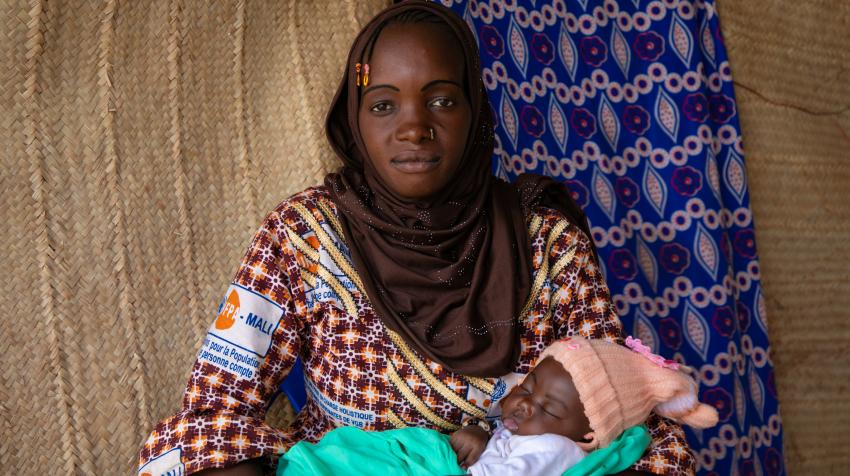Momentum is building to eliminate the most pervasive yet least recognized human rights abuse in the world -- violence against women. Studies show that 70 per cent of women experience some form of physical or sexual violence in their lifetime. Everywhere, communities, civil society and governments are mobilizing to end practices that harm the health, dignity, security and autonomy of women and negatively impact society as a whole. The United Nations system is working together to support partners in this effort.
NETWORK OF MEN LEADERSOn 24 November 2009, United Nations Secretary-General Ban Ki-moon launched the Network of Men Leaders who have taken a public stance to eliminate violence against women. Members of the Network include Brazilian novelist Paulo Coelho, Spanish Prime Minister José Luis Rodríguez Zapatero, former Chilean President Ricardo Lagos, Nobel Peace Prize laureate Archbishop Desmond Tutu of South Africa, and many other distinguished men who will add their voices to the growing global chorus for action.
This new network is part of the Secretary-General's UNiTE to End Violence against Women campaign, launched in 2008, which is galvanizing action across the UN system and the world. It calls for all countries to put in place, by 2015, strong laws, multi-sectoral action plans, preventive measures, data collection and systematic efforts to address violence against women and girls. It is a unified effort of the UN system to generate momentum and concrete action, building on the work that has been done by women's groups in many countries.
Over the years, we have seen mounting efforts by governments, non-governmental organizations, women's groups, community groups and other networks to eliminate violence against women. Today, there is better understanding of the nature and scope of violence and its impact on women and society. Legal and policy frameworks have been established at the national and international levels. But much more needs to be done to end impunity and change discriminatory attitudes that allow such violence to continue.
To this day, violence against women remains largely hidden in a culture of silence. One in three women has either been beaten, coerced into sex or abused in some other way -- most often by someone she knows. Such violence violates human rights, undermines development, generates instability and makes peace harder to achieve. There must be accountability for the violations and survivors must be listened to and supported.
The UNiTE campaign and many other efforts are breaking the silence surrounding this issue and ensuring that violence against women is not just a woman's issue, but a political, social, economic and cultural issue that deserves a comprehensive response.
10 PILOT COUNTRIESThe UN, with its wide-ranging mandates and diverse entities, is well equipped to support a response that is comprehensive, backed by strong political clout and adequate financial resources. As part of its ongoing efforts, the UN system identified 10 pilot countries* for a coordinated and cross-sectoral response. In these countries, joint programmes have been developed on the basis of a thorough assessment of existing initiatives and capacities, especially in the areas of law, providing services, prevention and data collection. Efforts are also taking place in many other countries. Beyond UN programmes, the United Nations Trust Fund on Violence against Women has distributed more than $44 million to almost 300 initiatives led by governments, civil society and local authorities in 119 countries and territories.
The organization I head, the United Nations Population Fund, is closely involved in these initiatives, supporting programmes in pilot countries and beyond: in Indonesia and Honduras, for example, police and faith-based organizations have been trained to respond sensitively to cases of violence against women; in Guatemala, progress has been achieved simply through the improved coordination and synergy between national and local governments; in India and Nepal, national partners worked together to institutionalize a response with a special focus on using the health system as an entry point; and in Cambodia, a national law to address domestic violence was adopted in 2007. Addressing ¬gender-based violence is now part of the country's national development plan, which includes a domestic violence indicator to track progress in achieving Millennium Development Goal 3, to promote gender equality and empower women.
At the global level, the UN is strengthening data collection and analysis to monitor progress and identify gaps in countries. A database on violence against women was launched in 2009 as the first global "one-stop site" for information on measures undertaken by UN Member States to address violence against women. It will also help identify promising practices that can fight impunity and put an end to attitudes and stereotypes that permit or condone violence.
The UN is also on the verge of significant changes in its internal gender architecture. The proposals being discussed by the General Assembly call for the replacement of several current structures with a single dynamic UN entity that will significantly bolster our work to promote gender equality and address violence against girls and women. This is all the more important in conflict settings, where women's bodies often become battlegrounds and rape a method of warfare to humiliate, dominate or disrupt social ties.
A SECURITY RESPONSEIn resolution 1325 adopted in 2000, the Security Council, for the first time, addressed the impact of war on women, stressing the importance of women's inclusion in conflict resolution and their essential role in peacebuilding. Resolution 1325 has been translated into more than 100 languages. Eight years later, the Security Council, in resolution 1820, acknowledged that sexual violence was a security issue and therefore required a security response. In 2009, the Security Council deepened accountability to women and girls in situations of armed conflict by passing two resolutions, 1888 and 1889, that strengthen women's protection and address their exclusion from peacebuilding in post-conflict contexts. The Security Council also requested the UN Secretary-General to appoint a Special Representative to provide coherent and strategic leadership to address the issue.
All these resolutions provide a strong framework to engage women in conflict resolution, peacemaking and peacebuilding, to protect sexual and reproductive health, prevent violence against women in conflicts and protect them when violence does occur. The campaign "Stop Rape Now: UN Action against Sexual Violence in Conflict" is also galvanizing action. There are a growing number of grassroots initiatives by civil society, government institutions and other partners to speak out against violence against women in conflicts.
I am encouraged by all these initiatives but recognize the urgent need to do more. Ending violence against women must be given greater priority at all levels, and this includes more intense efforts to support community interventions. The need for greater political commitment remains, as does the need for a substantial increase of resources. More than sixty years ago, the founders of the United Nations reaffirmed their faith in "We the Peoples", in fundamental human rights, in the dignity and worth of the human being, and in the equal rights of men and women. Eliminating violence against women is a crucial step towards realizing this vision. This is not just an issue for women. It is an issue for everyone -- for men and boys, for families, for communities. It is both a global and a national issue. From common to rare, from accepted to unacceptable, from impunity to justice, from suffering to support, we must build a world where violence against women belongs to the past.
* Burkina Faso, Chile, Fiji, Jamaica, Jordan, Kyrgyztan, Paraguay, Philippines, Rwanda and Yemen.
The UN Chronicle is not an official record. It is privileged to host senior United Nations officials as well as distinguished contributors from outside the United Nations system whose views are not necessarily those of the United Nations. Similarly, the boundaries and names shown, and the designations used, in maps or articles do not necessarily imply endorsement or acceptance by the United Nations.



